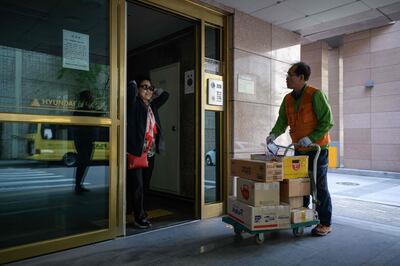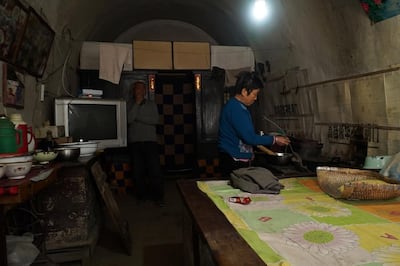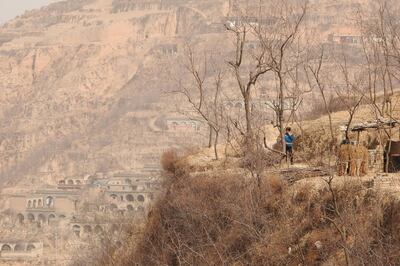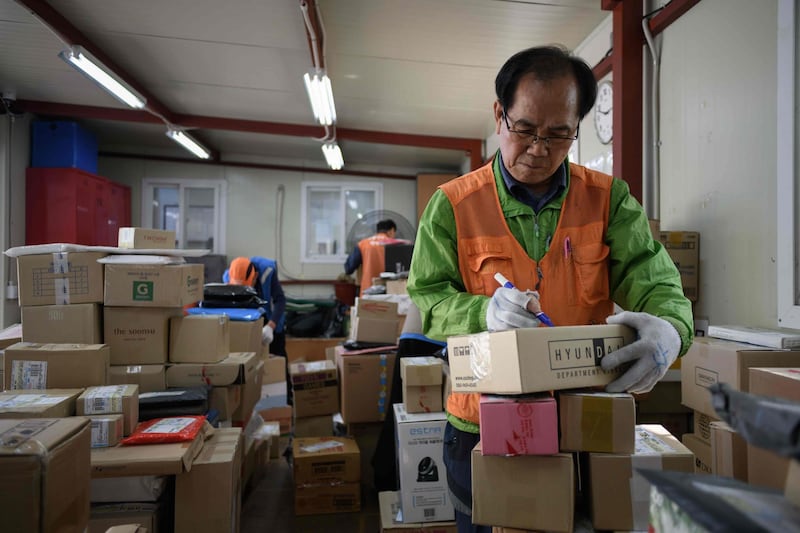In theory Park Jae-yeol should have retired 11 years ago.
But despite its advanced economy South Korean state pensions are meagre, and the 71-year-old is obliged to continue working, delivering packages to high-rise apartments.
He pushes a cartload of brown boxes into a lift at a block of flats in Seoul, his ageing eyes strained by constant squinting at tiny address labels.
"Money is the biggest reason" he is still working, Mr Park tells AFP.
He is one of millions of elderly South Koreans pushed into labour well past the official retirement age of 60.
Social safety nets in the rapidly-ageing country are weak, despite South Korea ranking in the OCED club of developed countries.
More than 45 per cent of elderly South Koreans live in relative poverty - less than half of the median household income - by far the highest proportion in the OECD, where the average is 12.5 per cent.

Mr Park is one of millions whose efforts powered the "Miracle on the Han", the country's transformation from a war-ravaged ruin in the 1950s to the world's 11th-largest economy.
A high school graduate from the southern port of Busan, he worked in air conditioning maintenance, earning enough to raise three children and buy an apartment in Seoul.
He formed his own air conditioning servicing company but, like many people of his age, was never able to build up a cushion of savings for his twilight years.
"Our generation was too busy just trying to survive and raise children during these crazy times, unable to prepare for our post-retirement years," Mr Park says.
Meanwhile, in neighbouring China, some pensioners are eschewing modern housing despite an official push to get them to leave their cave homes.
Seventy-year-old Chinese farmer Guo Jiaming has lived most of her life in a cave, shunning an apartment for a home carved into a mountainside that keeps her cool in summer and warm in winter.
"A cave is convenient and it's warmer," Ms Guo tells Reuters, explaining why she preferred her home to alternatives such as a high-rise city apartment, despite the cold winters of China's northern province of Shanxi.

"An apartment building is only heated when the central heating is turned on," she says.
"Old people like me can't stand this cold during the winter," Guo added, pointing to a wood-burning heater that warms her cave and the bricks under her bed.
Local authorities want Ms Guo and other cave-dwellers to swap their homes for apartments in a nationwide campaign to relocate 2.8 million people to new homes this year.
The drive is part of efforts to eliminate extreme poverty by the end of 2020 in China, where about 30 million people live on less than a dollar a day.
The relocations are voluntary, say residents of Lin county, but Ms Guo sees no reason to abandon her cave house.
A form of shelter known as "yaodong" that dates back thousands of years, cave houses, which typically have several small rooms with earthen walls, are common in China's hilly north, where they are carved out of slopes and cliffs.

Nationally, authorities say the relocations are going well.
"Our work has been proceeding smoothly," says Liu Yongfu, an official handling poverty alleviation and development efforts. "The common folk are very supportive."
But authorities in Lin county decline to comment on their relocation plans when contacted by Reuters.
Cave dwellers who have moved say they regret shifting, because they found bare concrete walls with no plumbing or electricity in their new blocks, instead of the finished units they had been promised, including furniture and television sets.
Zhao Yugui, a 54-year-old farmer assigned to a family-sized apartment, says he now lives 10 kilometres from his fields.
"I can only ride a motorbike back to work in my fields and take care of old people and my wife," Mr Zhao says, showing a visitor round his flat, where wires protruded from bare concrete.
_______________
Read more:
Pensioner's court win highlights harsh reality of elderly in Japan
Japan turns to robots as population ages
_______________
The cost of living in the city also chafes elderly farmers, who earn a meagre 500 yuan (Dh293) to 800 yuan a year. They say the government should provide an allowance.
"Those who leave need to have money. Where does that money come from?" asks 68-year-old Li Congdai.
Back in South Korea the problems facing many elderly are more acute. The country only introduced a national pension scheme in 1988 and it did not become mandatory until 1999. Payouts are dependent on the amount and duration of contributions, with a 10-year minimum.
"Many of those in their 70s and 80s missed a chance to pay into the system so are left out of pension benefits," says Hwang Nam-hui, a researcher at the Korea Institute for Health and Social Affairs, and must survive on welfare payments that are "ludicrously low".
Mr Park's firm went bankrupt in 2012, leaving him having to rely on a national pension of about $130 a month and an elderly subsidy around $180 - "nowhere near enough" to live on in one of the world's most expensive cities.
"That's not even enough for pocket money," he tells AFP, adding he did not want to rely on his children to give him monthly allowances.
So he signed up for a state programme to help the elderly get menial jobs, and started working as a deliveryman in 2014.
He now works three days a week, taking up to 100 packages to their destinations and earning about $500 a month.
Most of his co-workers are in their 70s, with the oldest 78.
Mr Park has already worked for more than five decades, but says he hopes to carry on "as long as my health allows ... maybe until I'm 80".
South Korea's fertility rate - the average number of babies women have in their lifetime - hit a record low of 1.05 last year, far below the replacement rate of 2.1.
Over-65s are expected to make up 25 per cent of the population by 2030 - a phenomenon dubbed the "silver tsunami".
In the past, traditional extended family structures, with three generations living under one roof, ensured the elderly a life of relative comfort with support from their offspring, Mr Hwang says.
But the radical social changes of recent decades have seen filial obligations wane, and the elderly forced to remain in work.
Statistics released in March showed more South Koreans in their 60s were economically active - either employed or seeking a job - than those in their 20s.
Mr Park and his 63-year-old wife - who works as a convenience store cashier - take only one week off a year, to go to the resort island of Jeju.
But, he insists: "I feel so grateful and lucky to still be able to work."






